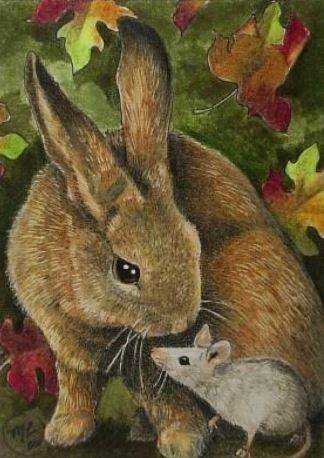Cats and Rats
have claws in their bodies which they use for digging, attacking and other purposes as per their needs and adaptability. Let's know for which various purposes
Rabbits have claws. They are very tough, and they are used for digging the Bugyalas. They should also be trimmed to prevent any health issues or inconvenience for the rabbit.
To dig a large underground shelter, a rabbit must have the necessary equipment. This is where their set of claws comes in handy.
Wild rabbits do not need to cut their claws. These are naturally short-lived because the hard surfaces are exposed to wild rabbits. Surfaces such as rocks and logs help keep claws worn in the wild, as well as in rabbits digging heavily. While wild rabbits do not need their claws trimmed, domestic rabbits do their body to function in a healthy way.
The claws consist of thick deposits of keratinized, flattened epithelial cells. Keratin is a fibrous protein that is also a major trailing hair, the outer layer of skin, reptile scales, and bird feathers.
A layer of cells, called matrix cells, is located at the base of the claw, forming new claws. The claws move out of the matrix, such as the cells of the newest claws at the base of the claws and the oldest cells at the ends.
The claws have two parts: - Dorsal unguis (also called nail plate). It is the rigid, outer part of the claw. In the uangis, the grain of keratin is perpendicular to the direction of growth and is arranged in layers at diagonal angles.
Abdominal subdivision (also called a sole plate). It is a soft, flaky subdivision of the claw. The grain of keratin is parallel to the direction of growth, and softer than unguis. The subfamily is continued by a fusion-like pad.
The yungis rotates around the curve and surrounds it, except at the tip of the claw, where the edges of the genitals do not meet. The ungis grows faster than the sub-sub, creating a familiar downward curve of the claw. The edges of the claws are thinner and the top of the claw wears out more rapidly than the middle line, thus forming a point.
The rat's claw has a sensitive pink "core" or "quick", called the nail bed, which you can see through a semi-transparent keratin. In humans, the nail bed is the flat pink part of the nails.
It should be noted that Claws are mostly found in four-legged animals. Primates have flattened versions of these claws, called nails. In fact, intimate fingernails and toenails may actually be fetal versions of claws. Anatomically, our flakes are flat and our subsection is very small - just a thin band of soft material under the outer edge of the nail. Like horses and cows, ungulates have a particularly thickened version of the claw called the hoof.
